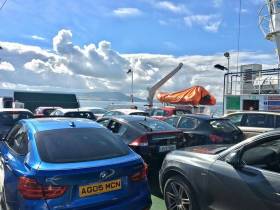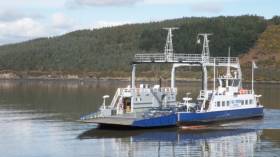Displaying items by tag: Passage East Ferry
Relief Ferry Returns to Dry Dock Forcing Routine Passage East Ferry to Remain In Service
#FerryNews - Attempts to operate the Passage East Ferry service in Waterford Estuary were beset with bad weather recently and mechanical issues however sailings resumed service yesterday afternoon, writes Jehan Ashmore.
The routine ferry, Frazer Tintern links Passage East on the Waterford side and Ballyhack in Wexford and takes 15 minutes for the 22-vehicle ferry to complete a round trip. On average there are 120 crossings daily.
The intended relief ferry, Frazer Aisling Gabrielle that normally serves Scenic Carlingford Ferry's route, had just completed an annual refit at New Ross Boat Yard. On arrival in Passage East on Wednesday, the 44-vehicle ferry was to have taken up operations however strong winds and tides led to cancelled sailings.
When weather conditions improved yesterday, Frazer Aisling Gabrielle was still prevented in sailing due to mechanical issues. This forced the relief ferry to return to the New Ross Boat Yard for further work on the banks of the Barrow. The dry-dock facility is where FBD Tintern arrived the day before for annual overhaul too, however the ferry was equally forced in returning to service.
Afloat previously monitored the Frazer Tintern make the original journey to the dry-dock located south of New Ross Port. This involved making a transit through the swing-bridge section of the Barrow Bridge which carried the railway line between Waterford City and Rosslare Harbour. An exception is container freight trains serving Belview (Port of Waterford) terminal located to the east of the city.
Despite the delays to Frazer Aisling Gabrielle, sailings in the absence of this ferry on the Scenic Carlingford Ferry link are been maintained by the Frazer Mariner.
Fortunately, Frazer Mariner is a refief ferry which is available to remain on the Carlingford service, though the ferry is due this month to return on the seasonal Scenic Lough Foyle ferry service. The launch of the seasonal service is however approaching the busy Easter Bank Holiday weekend.
All three ferry operations are part of the Limerick based Frazer Ferries Group which launched the first ever Carlingford ferry service last year aswell as the re-opening of the Foyle operation. In 2016 the group acquired the Waterford estuary service.
Scenic Ulster: Ferries Part of Ireland’s Largest Domestic Operator
#ferry –This summer saw the much awaited launch of Scenic Carlingford Lough service, however the Limerick based owners introduced another ferry in Ulster this season, writes Jehan Ashmore.
To recap firstly is the new historic first Carlingford service which saw operator, Frazer Ferries Group began sailings in July. The route is operated by the 44 vehicle ferry, Frazer Aisling Gabrielle plying the lough between Greenore, Co. Louth and Greencastle, Co. Down.
Originally the launch of Scenic Carlingford Ferry was to have taken place in June, however there were delays due several reasons, among them installation of bespoke navigational aids. On installation of these bouys, the former Shannon Ferries serving vessel and Lough Foyle ferry could finally begin crossings in July. The crossing of Carlingford Lough taking only 15 minutes.
The use of ‘Scenic’ as a trading prefix along with its the Lough Foyle counterpart is part of the corporate branding exercise by Frazer Ferries. By coincidence, Scenic Lough Foyle ferry also operates out of another Greencastle, but in Co. Donegal and connecting Magilligan Point in Co. Derry.
Formerly operating this route was Foyle Venture (of previous owners) which was transferred to the new Carlingford operation and renamed Frazer Gabrielle Aisling. In turn taking place on the Foyle route this summer was the newly introduced Frazer Mariner. This smaller ferry had served a career in Germany.
Both Ulster services save on mileage providing a short-cut for local motorists. In addition providing options for visitors to take touring routes and boost local economies.
Frazer Ferries are the largest operators of domestic services on the island of Ireland as last year the ferry firm acquired the business Passage East Ferry Company established in the 1980’s.
The ferry, F.B.D. Tintarn part of the previous outfit, continues to ply the waters in lower Waterford Estuary. This south-east link connects Passage East in Co. Waterford with Ballyhack in Co. Wexford. This route providing a commuter route for those working in Waterford in addition to a tourist short-cut.
Unlike the northern ferry routes, the southern service continues to retain its former trading name along with the ferry.
Northern Ferry On Southern Service 'Trials' for New Owners
#BerthingTrials – A pair of car ferries were on the Waterford Estuary link of Passage East-Ballyhack yesterday but only one vessel was actually operating in service, writes Jehan Ashmore.
Foyle Venture (44 vehicle/300 passenger) was carrying out 'berthing trials' for the Passage East Ferry Company service operated by the routine ferry F.B.D. Tintarn (28 vehicle/130 passenger). The south-east service provides commuters a short cut connecting Waterford City and the Wexford region.
The Ulster ferry had previously stopped winter service of the Lough Foyle Ferry Company's Greencastle-Magilligan Point route. Sailings are to resume between Donegal and Derry in Spring 2017.
The established ferry service in Leinster was founded in 1982 by Derek Donnelly who announced his retirement from the business earlier this year. In that timeframe Dunbrody and Edmund D have run the shuttle service until the current ferry FBD Tintarn. This ferry has been in service for a decade having made a debut in December 2006.
As Afloat covered in May the operation was sold to Frazer Ferries, the Limerick based company behind Carlingford Ferries that has proposed a new service in Northern Ireland. As for the Passage East based ferry FBD Tintarn, the prefix refers to FBD Holdings plc which retains a 70% share in the business, arising out of a legacy investment.
Afloat noted Foyle Venture had berthed in Waterford City earlier this week along the Frank Cassin Wharf, the former Bell Liner container terminal.
The ferry has since returned to the same city berth which in recent years was occupied by a passenger freight-ferry that had a wartime role. Afloat will have more on this soon.






























































